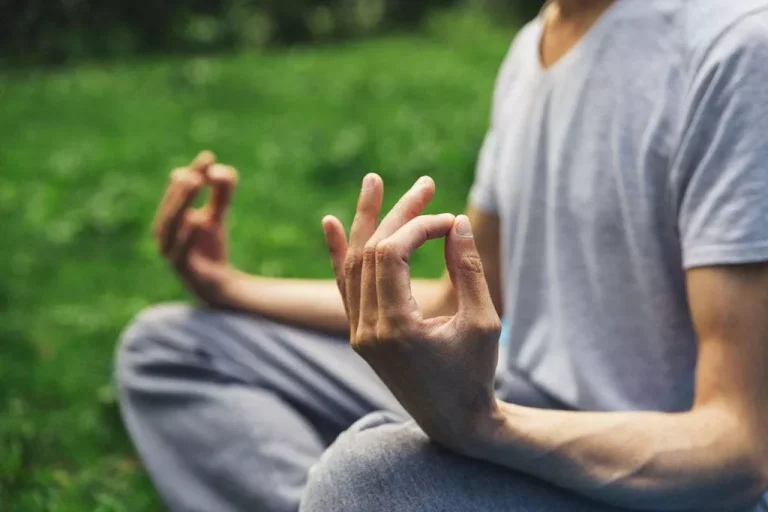Meditation for addiction recovery: Benefits and proven methods

One of the main goals of the addiction treatment and rehabilitation program is to help the patient find inner peace and harmony. An addict learns to manage stress, sense the world around them, and dispel negative ideas with the help of yoga, meditation, and spiritual activities.
Any addict has to make a significant shift to put their dependence on alcohol and psychotropic drugs behind them. You can begin the path of rectification and enjoy an extended time of uninterrupted intellectual and psycho-emotional recovery by engaging in spiritual activities, especially yoga, and meditation for addiction. This article will explain the types of meditation and how to use mindfulness meditation for addiction.
Benefits of meditation
It is difficult to manage the treatment of such severe illnesses as alcoholism and drug addiction without an integrated strategy. Despite variations in the guiding concepts and methods of instruction, all of them are intended to hasten the process of working on oneself and avert the future use of psychostimulants. Patients who attend mindfulness training and meditations regularly have the following benefits:
- Complete acceptance of the disease’s reality and readiness to receive expert assistance;
- Elimination of complexes and phobias;
- Stability of the psycho-emotional backdrop;
- Acquiring inner assurance in a lifetime rejection of alcohol and drugs;
- Letting go of unpleasant feelings and memories;
- Experiencing a sense of oneness with the world;
- Learning to manage one’s body and mind.
The patient needs a few sessions to see results, which inspires them even more. Additionally, the group’s presence helps you to feel as relaxed and uninhibited as possible.
The neurohormonal equilibrium is aided by deep meditation for addiction. Serotonin and dopamine concentrations in the blood are particularly normalized. After all, they maintain emotional balance, a positive attitude, and a sense of vigor. Processes unrelated to managing the condition benefit from meditation. Many patients report increased creativity, improved intuition, relief from ongoing worry, and reduced sleeplessness.


Take back control of your life and start on the road to recovery now.
How can meditation help?
Addicts respond to stress with better self-control and feel less dread when they meditate. After all, a person who drinks too much or is addicted to alcohol frequently just wants to feel less anxious and scared. It should be noted that alcoholics work to alter their mindset to experience a “higher feeling” that would let them ignore their troubles at the moment.
The subjectively pleasurable condition you may achieve through meditation makes the effects of alcohol appear tepid in comparison. The concerns above are mainly moderate and excessive alcohol usage. Meditation physically and symbolically assists addicts in getting back on their feet. To recognize and gather your resources, to understand the purposes and significance of life. Recently, drug specialists started using meditation for addiction, and they think it is a promising trend. Additionally, it aids in rehabilitation. It helps to balance emotions, control actions and ideas, and stabilizes the emotional background.
The essence of the method
There are several ways to meditate. These include breathing exercises, trance induction, chanting, dancing, and contemplation. Using “singing bowls” is common to hear unusual sounds and meditate while breathing quickly. Here, what matters most is a person’s desire to overcome their alcoholism.
The core of meditation is that as soon as it is practiced, emotional, mental, and biological processes start to change in the body at the cellular level. Serotonin and dopamine levels rise while cortisol (the stress hormone) levels drop. A person’s feelings of emotional stability without the use of medications start to return, and their thinking is optimized. It aids with societal adaptation.
Meditation techniques against addictions
Excellent results are achieved with mantra meditation for addiction recovery and Kundalini, mindfulness, and breathing meditations. It takes some time to master them, but it is possible with a mentor or a counselor.
Mantra meditation
Mantra meditation is simple to grasp, making it also practical among novices. Thoughts are focused in one particular way. Mantras assist in it. It might be complete phrases, poetry, or simply a single word. Words like “love” and “I am” are common mantras. Thoughts are directed in a specific direction, which lessens anxiety, worries, and the need to utilize addictive substances.
With steady, quiet breathing, the chosen mantra is said or thought repeatedly. It is preferable to perform daily mantra meditation; 5–10 minutes should be sufficient. Then, after a few weeks, you may already see a change in your attitude and sense of confidence.
Mindfulness meditation
The meditation is typically done while sitting comfortably in a serene, calm environment. Concentrating on the present moment is a critical component of mindfulness practices. Your mind becomes more at ease, allowing emotions and thoughts to flow easily. Your aim should be to watch your thoughts and sensations without participating or passing judgment.
Kundalini meditation
An active and dynamic type of meditation is Kundalini. Bodily activity is crucial and should guarantee stress’s physical and emotional condition is reduced or eliminated. It’s critical to enter oneself with movement to find equilibrium and inner calm. Here, the motions are more unsteady.
An hour is roughly how long Kundalini meditation lasts. There are four phases to the meditation, each lasting 15 minutes. Dancing, meditation, and stillness follow these four stages. Late afternoon or early evening is the best time to practice meditation. Here, a person unwinds after a long day. Once or twice a week, an addict spends an hour in the manner of meditation. Then, persistent positive effects are usually observed after two or three months.

Guided meditation
An instructor leads guided meditation sessions with guidance on breathing in person. When a teacher uses a casual tone to communicate visuals, it might give the listener the impression they are there. Audio, video, and mobile applications may all be used to facilitate guided meditation. People using the meditation technique imagine things, locations, or circumstances relaxing them.
Regular practice can help develop more self-discipline, self-control, and the capacity to deal with their passions healthily — qualities that addicts lack. After all, there is always a choice: to persevere and stay in the meditation or to give up. And at this point, willpower, mental stability, and spiritual stability will grow.
Breathing meditation
The kind of meditation aims to relax the mind and cultivate inner serenity. It is often carried out with the eyes closed while seated comfortably. An addict focuses on each inhalation and exhalation as they breathe. It is vital to slowly and thoroughly inhale. As you relax your muscles, keep your attention on your breathing. Refocusing on your breathing might help you to bring your thoughts back to the present whenever it starts to stray.
A combination of yoga and meditation in the fight against addiction
While it is common among drug users to use their substances to escape reality, in yoga, you are required to focus internally on yourself. It means to be in the “here and now” moment, to face and admit your occasionally unpleasant thoughts, emotions, anxieties, and fears related to the past or concerns about the future. And this is a fantastic supplementary instrument in the process of psychological healing. The fixation with drugs is replaced with a new, constructive, healthy focus of attention from which new behavioral patterns are formed.
The body responds extremely favorably to breathing methods by regaining lost energy, and lessening the effects of stress, which results in better physical and mental health, a more robust immune system, and better sleep. It occurs as a result of the brain and lungs being oxygen-saturated. Finally, meditation can calm the mind and relax the body while affecting the restless, racing, chaotic mind.

This can be a difficult journey, but you don’t have to go it alone. Let us be your guide and provide you the environment needed to regain control of your life and begin the path to recovery.
Eco Sober Houses will help in the journey against addiction
Every case of alcoholism or drug addiction is unique, and the professionals at a sober house create a personalized treatment plan to suit each patient. The fact that all lessons are optional and are held in carefully designed spaces, along with the expertise of the instructors, ensures students will learn their material well.
You may keep your sobriety afterward and have a fulfilling personal and professional life thanks to the new information and abilities you acquired throughout training. Eco Sober Houses is concerned with its residents’ welfare and provides the ideal circumstances to reintegrate into society as brand-new individuals.




